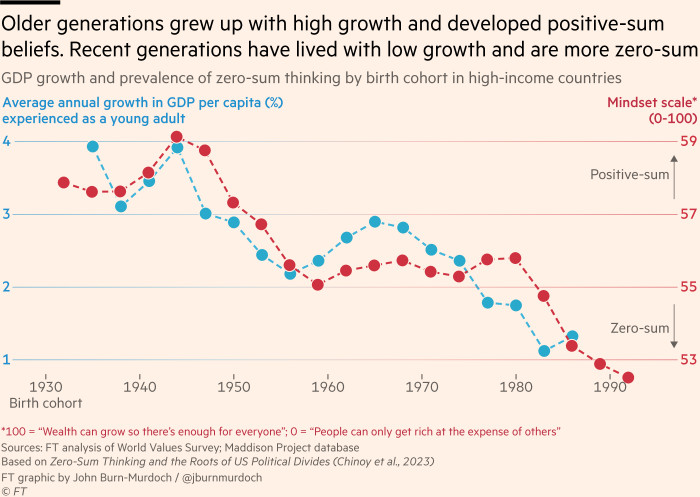Obtain free Information Factors updates
We’ll ship you a myFT Every day Digest e mail rounding up the most recent Information Factors information each morning.
You wouldn’t sometimes consider affirmative motion advocates and anti-immigration nativists as being bedfellows. The previous group skews younger and consists overwhelmingly of progressives, and the latter skews old and conservative. However in response to an interesting new study out of Harvard College, they’ve one important factor in widespread: a predilection for zero-sum pondering, or the assumption that for one group to achieve, one other should lose.
The identical mind-set crops up on all method of points that reduce throughout conventional political divides. Roughly equal numbers of US Democrats and Republicans agree that “in commerce, if one nation makes extra money, then one other nation makes much less cash”. And whereas Democrats usually tend to say “if one earnings group turns into wealthier, this comes on the expense of different teams”, a 3rd of Republicans agree.
A zero-sum mindset isn’t in itself clearly an excellent or dangerous factor, morally talking. The identical perception system that may drive one individual to handle the deprived may lead one other to drag up the drawbridge. However economically talking, there’s a rising physique of evidence that such a worldview is related to demotivating beliefs — the sense that further effort isn’t rewarded — and in flip with decrease charges of innovation on the societal stage.
The place this will get particularly attention-grabbing is that the causal arrow seems to function in each instructions. Among the many most placing Harvard findings was the invention that there’s a sturdy relationship between the extent to which somebody is a zero-sum thinker, and the financial surroundings they develop up in.

If somebody’s early life had been spent towards a backdrop of abundance, progress and upward mobility, they have an inclination to have a extra positive-sum mindset, believing it’s potential to develop the pie fairly than simply redistribute parts of it. Individuals who grew up in harder financial circumstances are usually extra zero-sum and sceptical of the concept that onerous work brings success. These attitudes are completely rational.
The sample holds whether or not you have a look at individuals who grew up on the identical time however in international locations with various financial fortunes, or completely different generations who grew up in the identical locations however towards a shifting financial backdrop.
Each 5 to 10 years, the World Values Survey asks individuals in dozens of nations the place they might place themselves on a scale from the zero-sum perception that “individuals can solely get wealthy on the expense of others”, to the positive-sum view that “wealth can develop so there’s sufficient for everybody”.
The typical response amongst these in high-income international locations has turn out to be 20 per cent extra zero-sum during the last century. Furthermore, two distinct rises within the prevalence of zero-sum attitudes have coincided with two slowdowns in gross home product progress, one within the Seventies and one other previously twenty years.

The identical sample holds inside particular person international locations. Britons and People have turn out to be considerably extra prone to imagine that success is a matter of luck fairly than effort exactly as earnings progress has slowed.
To be clear, nobody is arguing that this shift in mindset isn’t justified. When the pie was rising quickly, the typical individual’s materials circumstances had been certainly extra liable to enhance with out the help of luck or connections. And if developed societies are extra involved with equity, that’s no dangerous factor.
However, because the authors of the Harvard examine level out, an increase in zero-sum pondering has some disagreeable side-effects. Populism, conspiracy theories and nativism are all rooted within the belief that one group good points on the expense of others, and all these have risen of late. Self-identified Democrats who voted for Donald Trump in 2016 scored very excessive on zero-sum beliefs.
A latest suite of experiments within the UK and US additionally discovered constant proof that zero-sum pondering predisposes individuals to downplay the potential advantages of belief and co-operation, and see others as potential rivals or threats fairly than companions and collaborators.
The danger is that we’ve tipped right into a damaging cycle, with an financial slowdown fostering extra suspicious and defensive pondering. That might act as a brake on the kinds of bold and utilitarian insurance policies that may increase progress in direction of earlier ranges.
Pushing again towards this development would require political bravery and a reversal of the latest retreat from globalisation seen in recent times. The query is whether or not our leaders have additionally caught the zero-sum bug.